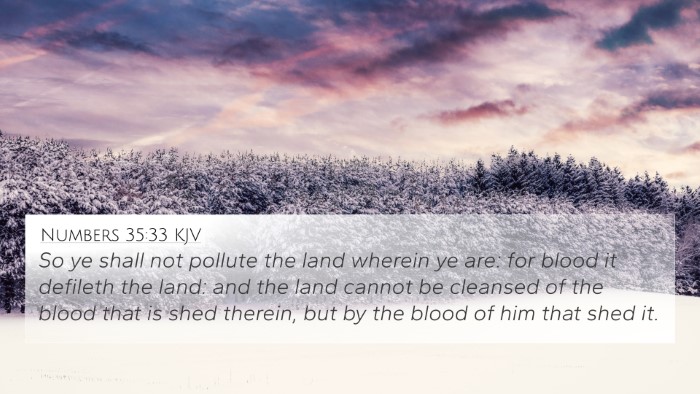Understanding Judges 9:24
Verse: Judges 9:24 (KJV) - "That the cruelty done to the threescore and ten, and the blood of their children, which was slain, should come, and they said, Let us die to revenge our brothers the sons of Gideon, who were slaughtered in an act of violence."
Summary of the Verse
This verse highlights a pivotal moment of retribution and the cyclical nature of violence and vengeance within the narrative of Judges. The context discusses the atrocities committed against Gideon's descendants and foreshadows the divine judgement that would befall the perpetuators of such cruelty.
Thematic Insights
Foundational commentaries such as those by Matthew Henry, Albert Barnes, and Adam Clarke provide nuanced interpretations of this verse, linking it to overarching themes in Scripture, including justice, vengeance, and the impact of political power.
Matthew Henry's Commentary
Matthew Henry emphasizes the principle of divine justice, suggesting that the blood shed would ultimately seek justice, symbolizing the inevitability of retribution in the realm of God’s governance. He discusses the broader implication of such violence as a means to show that God will avenge His people.
Albert Barnes' Commentary
Albert Barnes provides insight into the moral implications of Abimelech’s actions against his half-brothers. He notes that this act of fratricide represents the tragic consequences of ambition and greed, leading to chaos. According to Barnes, the verse serves to foreshadow the eventual downfall of Abimelech as the cycles of sin and vengeance play out.
Adam Clarke's Commentary
Adam Clarke connects this narrative to the larger scriptural events surrounding the nation of Israel's governance. He explores the theme of leadership's responsibility and the consequences that arise from wrongful acts caused by gaining power unlawfully. Clarke underlines that Israel’s historical pattern indicates a need for leaders who are chosen by God and not through schemes.
Connections to Other Bible Verses
Judges 9:24 connects deeply with various themes in Scripture. Here are notable cross-references:
- Genesis 4:10 - God's declaration of Cain's punishment draws parallels to the consequences of fratricide.
- 2 Samuel 3:27-30 - The repercussions of Abner's death reflect the volatility of blood feuds in Israel.
- Galatians 6:7 - The principle of sowing and reaping resonates with the judgment waiting for those who commit injustice.
- Proverbs 16:5 - Highlights the Lord's disdain for the proud, linking to the theme of divine justice.
- Matthew 23:35 - The cycle of violence against God’s prophets echoes this murder motif.
- Romans 12:19 - Apostolic teachings on vengeance reflect the theological foundation that God will avenge wrongdoings.
- James 1:20 - Emphasizes the futility of human wrath compared to God's righteousness.
Comparative Bible Verse Analysis
By understanding and analyzing Judges 9:24 alongside the mentioned verses, one can observe various connections that elucidate the narrative’s grim reality regarding retribution and the nature of leadership in Israel. Cross-referencing Biblical texts like these can deepen understanding of divine justice and human conflict.
Tools for Bible Cross-Referencing
Utilizing a Bible concordance or a specialized Bible cross-reference guide, readers can explore how Judges 9:24 interacts with themes found throughout Scripture. Such tools assist in discovering connections between Bible verses and understanding intricate relationships within the biblical narrative.
Conclusion
Judges 9:24 serves as a significant reference for reflecting on themes of revenge, justice, and the consequences of human action. The interconnectedness found in the Scriptures calls for a comprehensive Bible cross-reference approach for those wishing to delve deeper into the theological implications of these narratives.
Further Study Suggestions
- Employ cross-referencing Bible study methods to analyze related themes.
- Investigate Bible verses that support specific themes found in Judges.
- Consider the role of vengeance in various biblical contexts while comparing Old and New Testament interpretations.
- Explore Bible cross-references for sermon preparation targeting themes of justice and morality.










